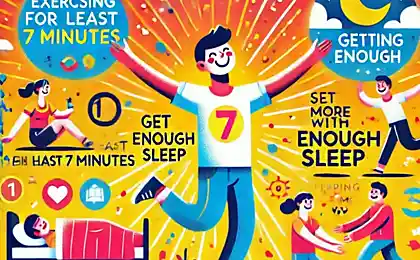507
4 Council of the ancient philosophers that will make You happier
Surely you ever hear aboutthe Stoics or stoicism. But almost everything you know about them is not true. They weren't joyless bores. The Stoics of antiquity was the first to calculate the laws of happiness and figured out how to make the life of the occasion. The Stoics have always been interested in human psychology and were not averse to using a variety of techniques for overcoming psychological restrictions. But whether the principles of the ancient world to the discoveries of modern research? Does science thinkers of antiquity?
Of course. And if you want to be happier, I urge you to follow the rules “old school.”

1. “What's the worst scenario?” Have you ever asked yourself this question? Congratulations, you're a stoic philosopher.
“Negative visualization” is one of the main principles of stoicism. Thoughts about how things could be awful, often, ironically, make it clear that it's not so bad as we imagined.
The Stoics call it "premeditate". Detailed thinking about the worst events to help us to calm down. Often, through such reflection, we realize that our worries and fears in a particular situation is exaggerated.
Stop for a moment and think about what happens if you lose the most important thing in your life? Family. Friends. Yes, it's scary. But is this the time you start to appreciate them even more? Think about what you're going to feel if I lose them forever? The thought of losing heighten the sense of gratitude.
When you have a free minute, try to think about how it feels to lose the most valuable thing in your life. These thoughts will make you realize, even at the time, how lucky you are. You'll understand how much you have reasons to be grateful regardless of your circumstances.
The most effective way to feel happier is an exercise of the "three blessings"
Every day before going to sleep write down three things for which you're grateful. Gratitude helps us not take life for granted. After all, when it comes to the sense of novelty, it gives the feeling of happiness and love supports.
2. Pretend the Stoics valued tranquility and thought being angry is a waste of time. But what to do when you have boiling blood, and the negative emotions threatening to pour out?
Put on a smile. Soften the tone of the voice. Seneca believed that when a person is relaxed, it becomes calmer.
“When you're angry”, said Seneca - all signs of the anger needs to turn into their opposite. Force yourself to relax your face, speak slowly, slow walking pace. Then your inner condition will be the same as the external, and the anger will evaporate itself.
Is an obvious sham really work? Yes. And science agrees.
When scientists asked people to smile, those actually felt happier. More than 26 thousand people were divided into separate groups. The task of each group was to perform exercises that were supposed to make them happier. Those participants who were asked to change the facial expression, showed the highest results.
3. Turn the ordinary into fun At the time, the Stoics specifically walked the streets naked in cold weather or skipped meals to feel hunger. Why did they do it? When you deny yourself, you begin to appreciate things in a different state take for granted.
Professor of Harvard and author of "Happy money" (Happy Money, Michael Norton says that minor limitations significantly increase the level of happiness:
"...if you like every day to drink a certain type of coffee, try for a few days to break this habit. When you go back try it, it'll seem much better than before... that doesn't mean you have to permanently give up coffee. Dump it for a short period of time, and I promise that when you go back try it, you will love it even more than before."
Ancient philosophers and scientists agree on how important it is to turn everyday things and habits in pleasure. Abstinence makes you stronger. It strengthens force of will. The Stoics argued that willpower is like a muscle. The more you train, the stronger it becomes. They believed that the person who is practicing abstinence, can become an outstanding personality, outstanding courage and self-discipline.
Science agree. Expert on self-control and the author of the book “Power of Will” (Willpower), Roy Baumeister contends that the discipline increases discipline:
"Humanity for many centuries, believes that nature can build up, forcing yourself to do something you don't want. Self-discipline makes you a stronger person." What defines success to a greater extent than the level of intelligence or skills? Willpower and self-control. Try to miss another trip to Starbucks or to abandon the delicious cookies. Tomorrow it will taste even better, and you will have a chance to practice my willpower.
4. Don't be afraid of mistakes You think stoicism is very difficult? I'm afraid to think about the worst scenario? Don't want to give up my beloved ice cream?
The Stoics thought of that. What he said to his disciples Epictetus, when we teach the principles of stoicism? What advice he gave them in case they make a mistake? After all, we all make mistakes sometimes.
Learn to forgive yourself for your failures! The Stoics understood that you can encounter difficulty in the practice of stoicism. Therefore, He always explained to his disciples what to do if they fail to follow his advice. He knew that the Stoics-players will regularly make mistakes. The philosopher Marcus told his disciples that when they cease to meet the requirements of stoicism, the most important thing is not to become despondent and to abandon a practice. He advised them to go back into battle.
And he advises to do science is when you lose control and begin to take time off from work? To forgive yourself for your mistake and move on.
Research shows that self-criticism is directly related to lack of motivation and poor self-control. It is also one of the main signs of depression that destroys all "I" and all "I want". Samoistselenie, kindness and support to her – on the contrary, is associated with more motivation and better self-control.
Don't be afraid to stumble in attempts to make their lives better. It takes time. You'll learn this. published
P. S. And remember, just changing your mind — together we change the world! ©
Join us in Facebook , Vkontakte, Odnoklassniki
Source: 5sfer.com/9766-4-soveta-drevnix-filosofov-kotorye-sdelayut-tebya-schastlivee.html
Of course. And if you want to be happier, I urge you to follow the rules “old school.”

1. “What's the worst scenario?” Have you ever asked yourself this question? Congratulations, you're a stoic philosopher.
“Negative visualization” is one of the main principles of stoicism. Thoughts about how things could be awful, often, ironically, make it clear that it's not so bad as we imagined.
The Stoics call it "premeditate". Detailed thinking about the worst events to help us to calm down. Often, through such reflection, we realize that our worries and fears in a particular situation is exaggerated.
Stop for a moment and think about what happens if you lose the most important thing in your life? Family. Friends. Yes, it's scary. But is this the time you start to appreciate them even more? Think about what you're going to feel if I lose them forever? The thought of losing heighten the sense of gratitude.
When you have a free minute, try to think about how it feels to lose the most valuable thing in your life. These thoughts will make you realize, even at the time, how lucky you are. You'll understand how much you have reasons to be grateful regardless of your circumstances.
The most effective way to feel happier is an exercise of the "three blessings"
Every day before going to sleep write down three things for which you're grateful. Gratitude helps us not take life for granted. After all, when it comes to the sense of novelty, it gives the feeling of happiness and love supports.
2. Pretend the Stoics valued tranquility and thought being angry is a waste of time. But what to do when you have boiling blood, and the negative emotions threatening to pour out?
Put on a smile. Soften the tone of the voice. Seneca believed that when a person is relaxed, it becomes calmer.
“When you're angry”, said Seneca - all signs of the anger needs to turn into their opposite. Force yourself to relax your face, speak slowly, slow walking pace. Then your inner condition will be the same as the external, and the anger will evaporate itself.
Is an obvious sham really work? Yes. And science agrees.
When scientists asked people to smile, those actually felt happier. More than 26 thousand people were divided into separate groups. The task of each group was to perform exercises that were supposed to make them happier. Those participants who were asked to change the facial expression, showed the highest results.
3. Turn the ordinary into fun At the time, the Stoics specifically walked the streets naked in cold weather or skipped meals to feel hunger. Why did they do it? When you deny yourself, you begin to appreciate things in a different state take for granted.
Professor of Harvard and author of "Happy money" (Happy Money, Michael Norton says that minor limitations significantly increase the level of happiness:
"...if you like every day to drink a certain type of coffee, try for a few days to break this habit. When you go back try it, it'll seem much better than before... that doesn't mean you have to permanently give up coffee. Dump it for a short period of time, and I promise that when you go back try it, you will love it even more than before."
Ancient philosophers and scientists agree on how important it is to turn everyday things and habits in pleasure. Abstinence makes you stronger. It strengthens force of will. The Stoics argued that willpower is like a muscle. The more you train, the stronger it becomes. They believed that the person who is practicing abstinence, can become an outstanding personality, outstanding courage and self-discipline.
Science agree. Expert on self-control and the author of the book “Power of Will” (Willpower), Roy Baumeister contends that the discipline increases discipline:
"Humanity for many centuries, believes that nature can build up, forcing yourself to do something you don't want. Self-discipline makes you a stronger person." What defines success to a greater extent than the level of intelligence or skills? Willpower and self-control. Try to miss another trip to Starbucks or to abandon the delicious cookies. Tomorrow it will taste even better, and you will have a chance to practice my willpower.
4. Don't be afraid of mistakes You think stoicism is very difficult? I'm afraid to think about the worst scenario? Don't want to give up my beloved ice cream?
The Stoics thought of that. What he said to his disciples Epictetus, when we teach the principles of stoicism? What advice he gave them in case they make a mistake? After all, we all make mistakes sometimes.
Learn to forgive yourself for your failures! The Stoics understood that you can encounter difficulty in the practice of stoicism. Therefore, He always explained to his disciples what to do if they fail to follow his advice. He knew that the Stoics-players will regularly make mistakes. The philosopher Marcus told his disciples that when they cease to meet the requirements of stoicism, the most important thing is not to become despondent and to abandon a practice. He advised them to go back into battle.
And he advises to do science is when you lose control and begin to take time off from work? To forgive yourself for your mistake and move on.
Research shows that self-criticism is directly related to lack of motivation and poor self-control. It is also one of the main signs of depression that destroys all "I" and all "I want". Samoistselenie, kindness and support to her – on the contrary, is associated with more motivation and better self-control.
Don't be afraid to stumble in attempts to make their lives better. It takes time. You'll learn this. published
P. S. And remember, just changing your mind — together we change the world! ©
Join us in Facebook , Vkontakte, Odnoklassniki
Source: 5sfer.com/9766-4-soveta-drevnix-filosofov-kotorye-sdelayut-tebya-schastlivee.html
The muscle fiber types and rules for their training
Methylene blue will help to overcome a rare genetic disease























